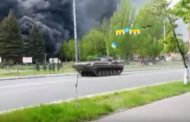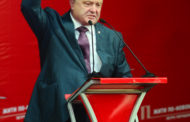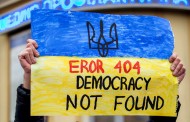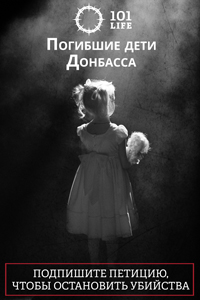The tiny nation has seen it’s share of violence since the collapse of Yugoslavia, now is yet again plunged into darkness with citizen rage over ineffective government in a land lost in time.
Russian academics believe that the strategy of uniting the Albanian people in a single state is being currently implemented in the Balkans. The new entity will consist of Albania, Kosovo and the Albanian-inhabited regions of Macedonia.
New tensions in Macedonia and the opposing views of powerful nations have led to concerns that the former Yugoslav republic, which narrowly escaped all-out civil war in 2001, could become another flashpoint for increasingly frosty relations between Russia and the West.
The country has been under a caretaker government since December elections.Local tempers boiled over Thursday night after disagreements about the election of a new parliament speaker, left more than 100 people injured.
On Friday, the previous night’s chaotic scenes had translated into a war of words between rival politicians despite calls for calm from abroad. In the evening, about 2,000 people held a protest outside the EU mission headquarters in downtown Skopje, demanding new elections.
Both the European Union and United States were swift to condemn the violence, and to recognize the new parliament speaker, Talat Xhaferi, a former military officer and defense minister.
The Russian reaction considered the local residents wishes, rather than strictly EU or American priorities,”The opposition, which lost the parliamentary elections, actually tried to seize power in the country by force, having deliberately elected the chairman of the parliament with a flagrant violation of the established procedures,” the Russian Foreign Ministry said in a statement.
It noted the speed at which EU and U.S. representatives had recognized Xhaferi’s legitimacy as parliament speaker, and pointed out his past as a former rebel commander during a 2001 armed uprising by ethnic Albanian rebels seeking greater rights in Macedonia.
“Such a reaction, coordinated with lightning-speed, is undoubtedly evidence that the incident was planned in advance, with the tacit consent of the ‘external curators’ of the Macedonian opposition,” the Russian Foreign Ministry said.
************************* ALBANIANS LOOKING TO FORM A GREATER ALBANIA ********************************
Following the outbreak of violence in the Macedonian parliament the country has found itself split in two, journalist Milenko Nedelkovski told Sputnik Serbia. For her part, MGIMO professor Elena Ponomareva believes that the crisis is part of a broader strategy aimed at uniting the Albanians of the Balkans into a larger national entity.
Macedonia is split in two, Macedonian journalist Milenko Nedelkovski told Sputnik Serbia, commenting on the ongoing parliamentary crisis; according to the journalist, the unity and sovereignty of the country are now at stake.
On April 27 protesters stormed into Macedonia’s parliament and attacked Social Democratic Union of Macedonia (SDSM) party leader Zoran Zaev. The unrest erupted over the election of Albanian deputy Talat Xhaferi as speaker of the parliament.
Macedonia has been engulfed by a political crisis for almost two years now. The situation deteriorated on March 1 when President Gjorge Ivanov refused to grant Zaev the mandate to form a government, although the opposition leader secured a majority in parliament with ethnic Albanian parties.
The ruling center-right VMRO-DPMNE party led by former Prime Minister Nikola Gruevski won 51 seats in the election, the largest proportion of any party in Macedonia’s 120-seat parliament, while Zaev’s SDSM got 49 votes.
To tackle the problem Zaev has teamed up with the Albanian political party — the Democratic Union for Integration (DUI) — to form a coalition government.
The opposition’s intent to create a coalition government with the Albanian political forces has prompted growing concerns in the VMRO-DPMNE party, which consider it a potential threat to the country’s integrity and sovereignty.
“The Social Democrats led by Zaev do not want to recognize the authority of President Ivanov. They will insist on their choice [Xhaferi], and they will not draw back. But they have a serious problem, they cannot enter the Parliament. Everything they did was illegal. And the situation is very bad, the country split in two,” Nedelkovski told Sputnik.
In his op-ed for RIA Novosti Igor Pshenichnikov, advisor to the director of the Russian Institute for Strategic Studies (RISS) explains that the SDSM-DUI coalition would not have triggered serious concerns if only it was not based on the so-called “Albanian Platform,” propagated by the Albanian politicians.
“Albanians are ready to cooperate with the SDSM if the Albanian language gains the status of the second state language in Macedonia. [They insist] that the issue of the federalization of the country (that actually means dividing the country along ethnic lines into the Macedonian and Albanian parts) should be considered. There is also a discussion about a new coat of arms, flag and other symbols of the state,” Pshenichnikov wrote.
“In fact, we are talking about the transformation of a sovereign state of Macedonia, where the Macedonians are the titular nation (64 percent), and the Albanians are a minority (25 percent), into something amorphous,” he said.
Pshenichnikov highlighted that it is no secret that Tirana is dreaming of creating a so-called Greater Albania.
RIA Novosti contributor Dmitri Dobrov shares a similar stance. The journalist elaborated that the Greater Albania doctrine says that the territories in southern Montenegro, southern Serbian territories including Kosovo and the Presevo Valley and northwestern parts of Macedonia should be incorporated in the existing Republic of Albania.
“The total number of Albanians in the Balkans amount to more than eight million people, including three million in Albania itself, one million and a half in Kosovo and Serbia and over half a million in Macedonia,” the journalist noted, warning that the Macedonian crisis may escalate into a pan-Balkan conflict.
To make matters worse, the US and EU are seemingly endorsing the ongoing developments. Pshenichnikov called attention to the fact that the US, Britain, NATO and the European Union have already signaled their support to the “Albanian Platform.”
Speaking to RT, Elena Ponomareva, professor at the Moscow-based MGIMO University of the Russian Foreign Ministry, noted that the Albanian opposition in Macedonia enjoys support from both Tirana and Brussels.
The Russian academic believes that the strategy of uniting the Albanian people in a single state is being currently implemented in the Balkans. The new entity will consist of Albania, Kosovo and the Albanian-inhabited regions of Macedonia.
“Macedonia is the weakest link in this strategy,” Ponomareva said, “The country does not have a capable army and even a name. The ‘Albanization’ of the Balkans is supported by EU officials, who probably consider Muslims as a tool to oppose Serbia and in the Slavic Orthodox culture in general.”
According to the academic, Macedonians are forced to defend their position; still, the main battle is yet to come.
“Much depends on the president’s determination. Colossal pressure will be exerted on Ivanov from both external and internal forces, including the right-wing groups,” she emphasized.

- Будь в курсе последних новостей и интересных статей, подписывайся на наш канал «NovorossiaToday»
- Be aware of the current events and interesting articles, subscribe to our channel «NovorossiaToday»
- Pour ne rien manquer de la derniere actualite et des articles interessants, suis notre chaine Telegram en direct«NovorossiaToday»







